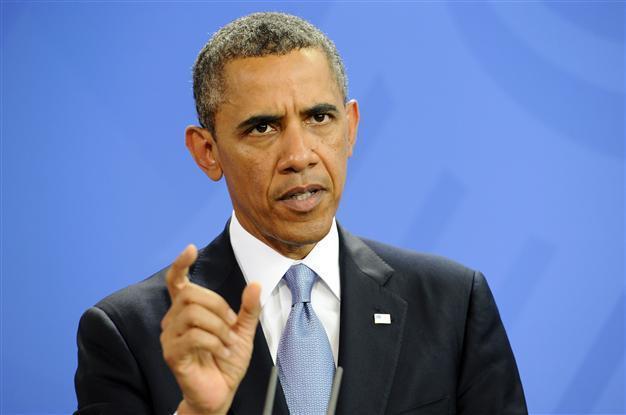Obama eyes Russia deal to cut nuke arms
BERLIN

S President Barack Obama gives a joint press conference with the German Chancellor on June 19, 2013 at the Chancellery in Berlin. AFP Photo
U.S. President Barack Obama said he wants to reduce deployed nuclear weapons by up to a third and revive negotiations with Russia to “move beyond Cold War nuclear postures,” in a speech on June 19 in Berlin.“After a comprehensive review I have determined that we can ensure the security of America and our allies, and maintain a strong and credible strategic deterrent, while reducing our deployed strategic nuclear weapons by up to one third,” he said.
“I intend to seek negotiated cuts with Russia to move beyond Cold War nuclear postures,” Obama said, speaking in front of the Brandenburg Gate that once stood alongside the wall that divided communist East Berlin and the West.
Ahead of Obama’s speech, Russian President Vladimir Putin said Russia would not allow for an “imbalance” in strategic nuclear deterrence. “We cannot allow the balance of the system of strategic deterrence to be disturbed or the effectiveness of our nuclear force to be decreased,” Putin was quoted by Russian agencies as saying at a government meeting, while discussing Russia’s military space program.
In the same speech yesterday, the U.S. president also said the United States would step up its efforts to close Guantanamo Bay prison. “Even as we remain vigilant about the threat of terrorism, we must move beyond the mindset of perpetual war, and in America that means redoubling our efforts to close the prison at Guantanamo,” Obama said.
“It means tightly controlling our use of new technology like drones, it means balancing the pursuit of security with the protection of privacy,” he added.
The president also touched on climate change and pledged that the United States would “do more” to tackle the threat, saying the world must do likewise “before it is too late.”
“Our generation must move toward a global compact to confront a changing climate before it is too late, that is our job, that is our task,” Obama said, adding that “peace with justice means refusing to condemn our children to a harsher, less hospitable planet.” He said Germany - which is fast building up solar, wind and other renewable energies - and Europe had led in efforts to battle the effects of a warming planet, melting ice caps and rising seas.
He said the United States had doubled renewable energies, boosted fuel efficiency in cars and brought down carbon emissions, but admitted that this was still not enough. “We know we have to do more and we will do more,” he said. He also linked these efforts to developing giants such as China and India. “With a global middle class consuming more energy every day, this must now be an effort of all nations, not just some. For the grim alternative affects all nations. More severe storms, more famine and floods, new waves of refugees, coastlines that vanish, oceans that rise,” Obama said.
Obama refuses to specify US aid to Syrian rebels
Obama refused to specify the exact nature of new US military aid to Syrian rebels, despite signals from top US officials that they will be get small arms and ammunition.
"I cannot and will not comment on specifics on our programmes related to the Syrian opposition," Obama said at a press conference with German Chancellor Angela Merkel.
Obama has refused to publicly specify exactly how Washington will increase aid to the Syrian opposition, after his government said it would offer military support for the first time after determining President Bashar al-Assad had used chemical weapons.
Previously Obama had warned against pouring more weapons into the conflict and had kept US aid limited to humanitarian and non-lethal supplies.
The US president also said in Berlin that reports in the United States that escalating American support to the rebels meant the White House was now on a slippery slope to a new Middle East entanglement were mistaken.
He said reports were "overcranked" when suggesting the US was heading into a new Middle Eastern war.
"What we want to do is end a war," he said, calling again for a political transition in Syria that does not include Assad.
Merkel said Berlin agreed that "Assad has lost his legitimacy" but reiterated the stance that "Germany has very clear legal rules that we do not send weapons into civil wars", saying this was universal and "has nothing to do with the question of Syria specifically".
But she added: "This doesn't mean that we can't play a constructive role, in the political process, humanitarian aid and the question about the right way" to help the moderate opposition and the people of Syria.
















